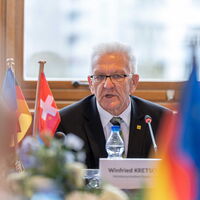Thematic areas of cooperation
Eucor has determined several thematic areas of cooperation to utilise joint strengths and pool competencies. These focus areas were defined after analysing potentials, locations and existing collaborative projects. Based on specific themes, the member universities establish consortia that are capable of conducting internationally visible and competitive research, while maintaining close ties to teaching and innovation. The main focus areas of Eucor are
- Quantum Sciences and Technology
- Personalised Health
- Sustainability
- European Identities.
Eucor also supports the development of new collaborations in the fields of teaching, research and innovation within and beyond these focus areas through its Seed Money scheme.
“Eucor connects five excellent universities from three countries. Together, we are researching issues of importance to the future in the Upper Rhine region. These are topics that are so essential that we can only find the best solutions together.”

Winfried Kretschmann
Minister-President of Baden-Württemberg, Germany
Quantum Sciences and Technology
Quantum technology research forms the basis for developing important future technologies. That is why Eucor participates in shaping the “second quantum revolution”, while also continuously expanding its focus on Quantum Sciences and Technology. The Center for Quantum Science and Quantum Computing (QSQC), which is a centre of excellence, was launched in 2017 at the University of Basel and University of Freiburg with a postdoc cluster, two doctoral schools and ten million Swiss francs in funding from the G.H.E. Endress Foundation. The “Quantum Science and Technologies at the European Campus (QUSTEC)” programme has also been making joint doctoral training possible since 2019. This programme, coordinated by Eucor, receives funding from the EU through the Marie Skłodowska-Curie Actions (MSCA) COFUND scheme. In addition, in 2022, the University of Strasbourg and the Karlsruhe Institute of Technology (KIT) established two quantum research institutes that work together closely, along with a cross-border professorship in quantum computing that is funded by the State of Baden-Württemberg, Région Grand Est and the Collectivité européenne d’Alsace. Finally, beginning in 2024, the Franco-German University (FGU) will promote the exchange of doctoral students in the Upper Rhine region through a French-German doctoral research group in which the KIT, the University of Strasbourg and the University of Freiburg will participate.
For more information, please visit:

Personalised Health
Global health systems are facing major challenges due to demographic and social change. By focusing on personalised health, Eucor works to contribute to the customisation of medical diagnoses, disease prevention and drug development in order to better cater to individual needs, specific environmental influences, personal lifestyles and genetic differences. In this focus area, Eucor also borrows national strategic ideas from France, Germany and Switzerland and applies these to the European context. Three Eucor member universities have medical faculties and university hospitals, and a research network called Personalized Health Basel is already in place at the University of Basel. In addition, all five member universities have strategic priorities in the life sciences. This focus area can also rely on a variety of scientific networks (such as Neurex, the trinational network in the field of neuroscience, and the Upper Rhine Immunology Group).
Another Eucor doctoral programme called Eucor Upper Rhine Immunology doctoral programme (EURIdoc), which is coordinated by Eucor and co-financed by the EU, in the area of immunology promotes the exchange of doctoral students in this thematic focus area. Because EURIdoc achieved the status of a French-German graduate school in 2023, doctoral students are also entitled to receive mobility grants from the Franco-German University (FGU).
For more information, please visit:
Sustainability
Through its focus on sustainability, Eucor seeks to contribute to solving pressing ecological, economic and social issues, while supporting the formation of a model region for sustainability. Against the backdrop of the United Nations’ Agenda 2030 for Sustainable Development, the member universities agreed on an understanding of sustainability as a multi- and interdisciplinary concept. As in its other focus areas, Eucor also builds on existing collaborations here – for example, the cross-border network Upper Rhine Cluster for Sustainability Research is already working on the governance of sustainable growth. Thanks to the French-German Institute for Environmental Research (DFIU), the Karlsruhe Institute of Technology also has many years of experience in cross-border, interdisciplinary cooperation. Furthermore, Eucor collaborated with its member universities and other research and economic partners on a feasibility study called “Innovation Region Fessenheim”, which was completed in 2022, to highlight potential prospects for investing in future-oriented technologies in the region. The member universities are also active in promoting the sustainable development of the region in several Interreg (an EU funding scheme) projects and in a dialogue with the Eucor cities. Thanks to the establishment of a cross-border professorship in the field of sustainable water management involving the University of Strasbourg, KIT and École nationale du génie de l’eau et de l’environnement de Strasbourg (ENGEES), another milestone has been achieved in the focus area of Sustainability.
For more information, please visit:

European Identities
In the focus area European Identities, Eucor explicitly draws on the tradition of humanistic education and the common history of the Upper Rhine region, which is strongly linked to today’s European values: freedom, democracy, peace and human rights. Thanks to the huge diversity in the branches of study in the humanities and social sciences and the multifaceted expertise that goes along with this, the European Campus is ideally suited for this focus area to achieve its full potential. European Identities builds on already existing academic networks, like Collegium Beatus Rhenanus, which is an Upper Rhine research group focusing on antiquity. Since 2021, two exploratory workshops involving researchers from Eucor member universities on the legacy of colonialism and its significance for the European Identities focus area have also taken place. Two cross-border professorships in law (University of Freiburg and University of Strasbourg) and in English (University of Basel and University of Freiburg), which are in the process of realisation, will also offer possible jumping-off points for this focus area.
